ASTANA – Business executives from Kazakhstan and Afghanistan signed 15 agreements, including nine for the supply of oil, worth $190.8 million at the Kazakh – Afghan business forum on Aug. 3.
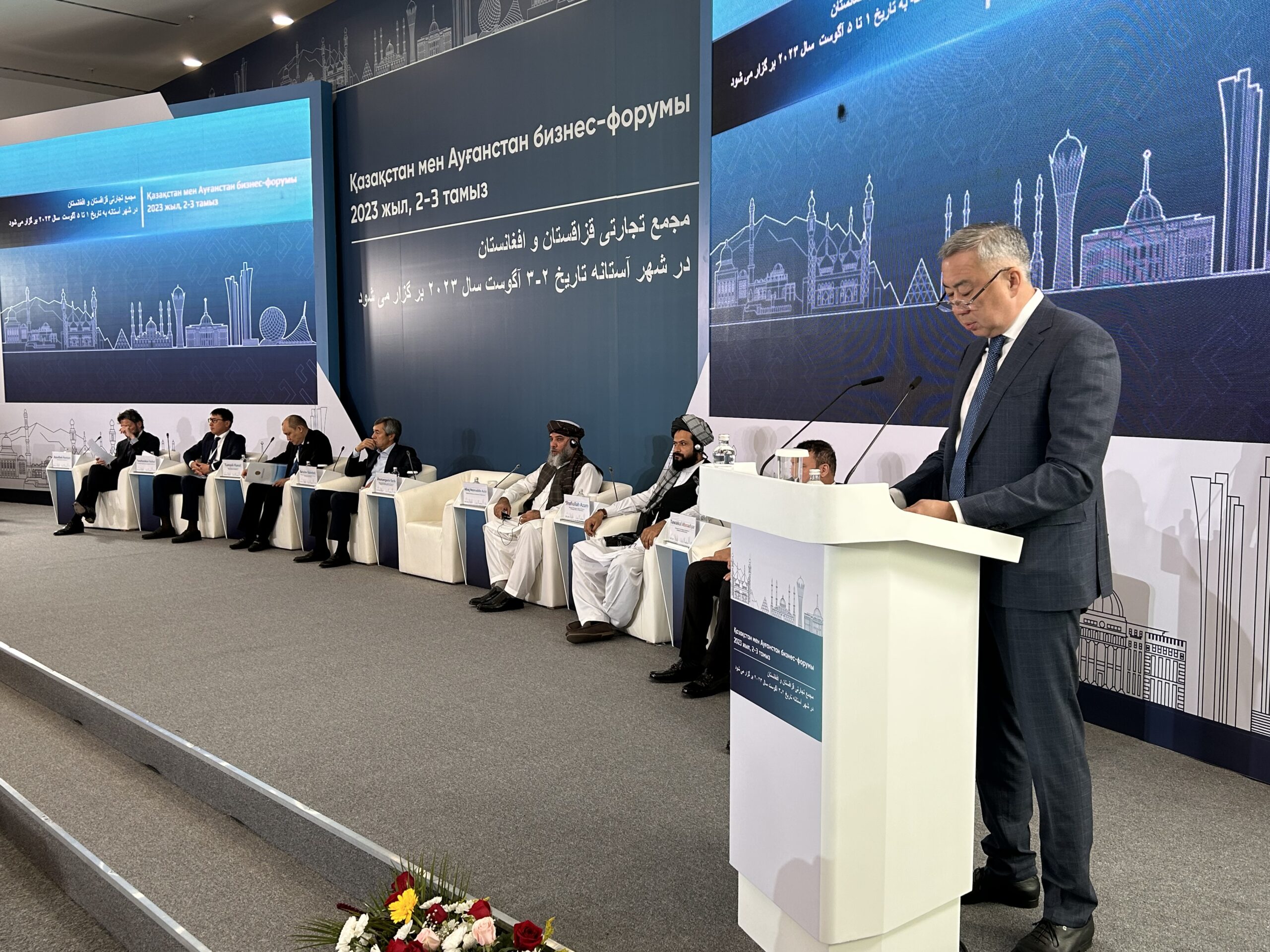
Serik Zhumnagarin said that Kazakhstan stands for the formation of Afghanistan as an independent, neutral, united, peaceful, democratic and prosperous state. Photo credit: The Astana Times.
The dialogue platform laid the ground for new projects, trade and economic cooperation, bringing together over 300 participants, including officials, business leaders, and manufacturers from both countries.
Welcoming the participants, Serik Zhumangarin, Deputy Prime Minister and Minister of Trade and Integration, reaffirmed that Kazakhstan stands for the development of Afghanistan as an independent, neutral, united, peaceful, democratic, and prosperous state and is interested in maintaining the existing trade, economic, transport, logistics and energy ties with the country.
The trade turnover between Kazakhstan and Afghanistan in 2022 reached almost $1 billion ($987.9 million), doubling the figures for 2021. Around 90% of the turnover falls on Kazakhstan’s exports, mainly processed products.
Trade between the countries for the first five months of this year hit $316.6 million, of which $310 million falls on Kazakhstan’s exports. Zhumangarin highlighted that the two countries could increase mutual trade to $3 billion soon.
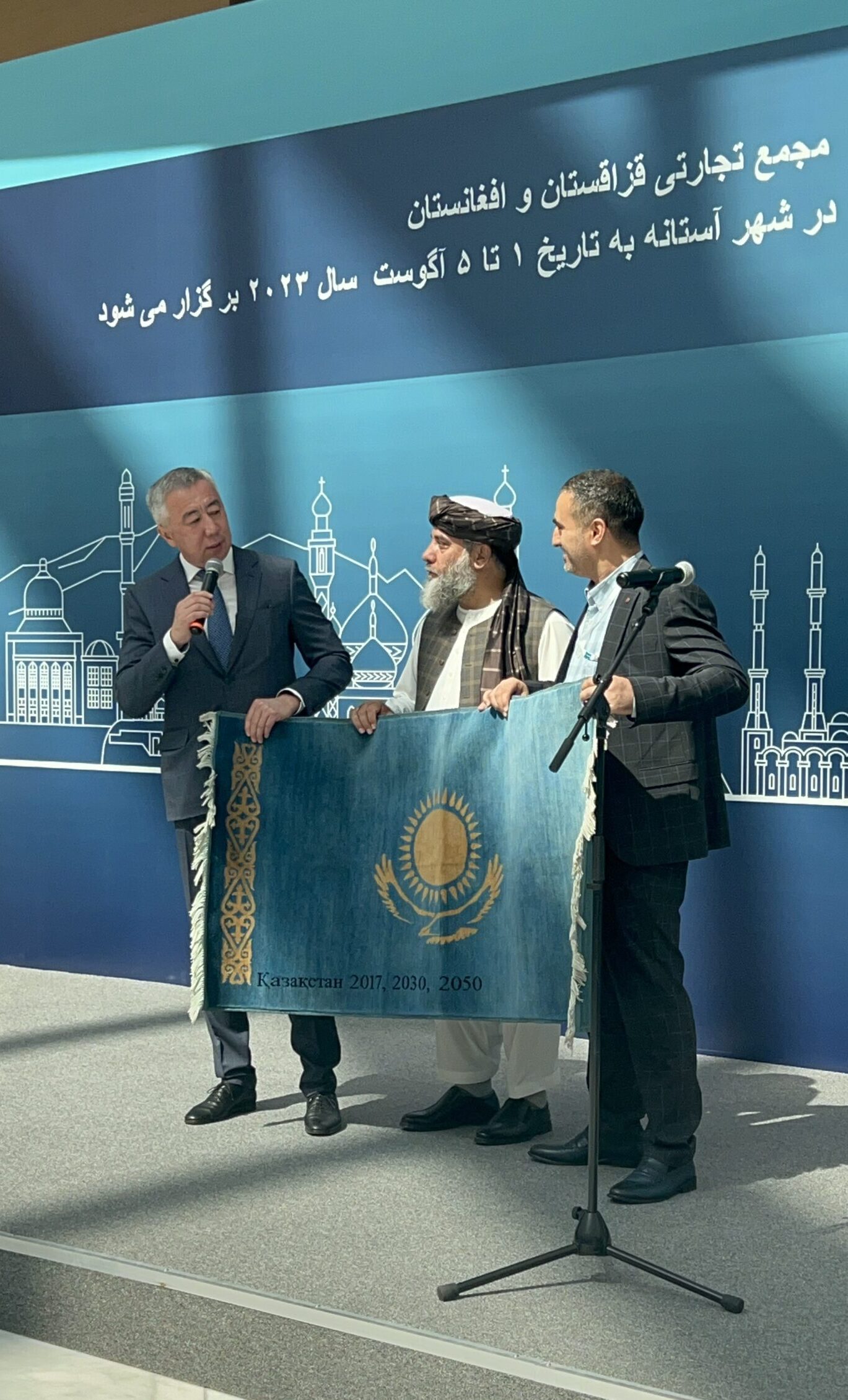
Afghan delegation presented handmade carpet to Kazakh partners. Photo credit: The Astana Times.
“Afghanistan is the largest consumer of Kazakh flour, which accounts for 1.3 million tons or 70% of the total flour exports. According to calculations, Kazakhstan has an export potential of deliveries to Afghanistan worth $500 million. This includes food, petrochemical, chemical, metallurgical, light, and machine-building industries,” he said.
Since 2005, Afghan businesses have invested $11.7 million into the Kazakh economy. Nearly 52 joint trade ventures operate in Kazakhstan.
Zhumangarin outlined prospective areas that both countries should focus on, including the preservation and increase in the traditional supply of Kazakh flour, implementation of economic projects, development of transport and logistics capabilities, and cooperation in the social sphere.
“Afghanistan is the transport corridor of Central Asia leading to Pakistan and India, which are currently of high interest for Kazakhstan in trade. Kazakhstan appreciates the initiative to build the Mazar-i-Sharif–Kabul–Peshawar railway trans-Afghan transport corridor, which will ensure uninterrupted interregional cooperation between the countries of Central Asia and the countries of South Asia and the Middle East,” he said.
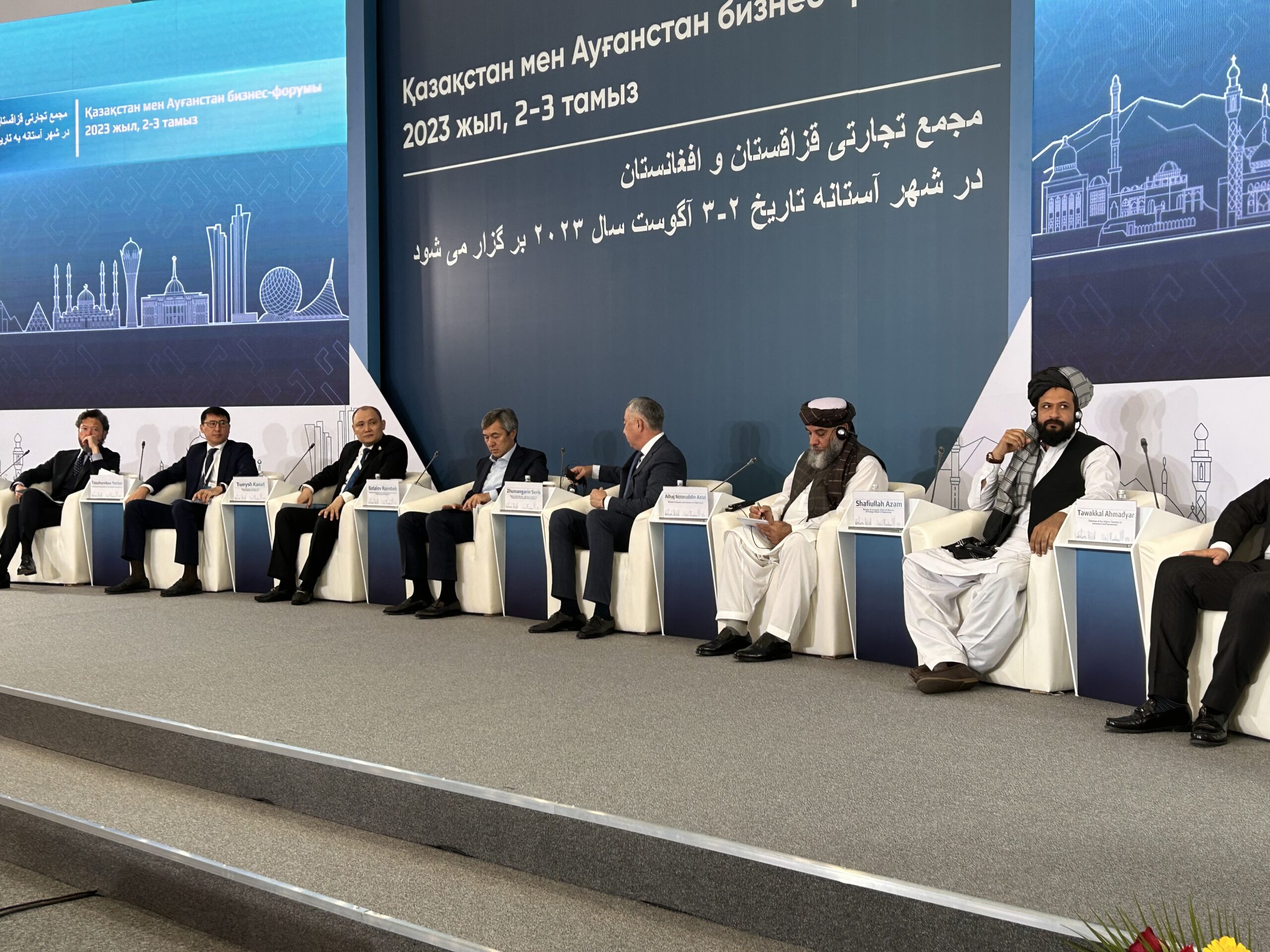
Speakers focused on the cooperation opportunities and challenges. Photo credit: The Astana Times.
Nooruddin Azizi, the Minister of Commerce and Industry of Afghanistan, mentioned the Kazakh delegation’s visit to Afghanistan in April, when the sides concluded partnership agreements in the priority areas and invited Kazakh businesspersons and investors to take part in the coming business meetings and trade exhibitions in Afghanistan.
“I hope that this meeting will be the beginning of growth and development of bilateral and regional relations through the understanding and conclusion of trade, transit, and investment agreements,” he said.
Throughout history, Afghanistan has been a gateway for cultural and commercial exchanges. The Afghan government seeks to make the country a vital participant in international and regional business meetings and exhibitions and become a trade corridor uniting four transit routes of a large region.
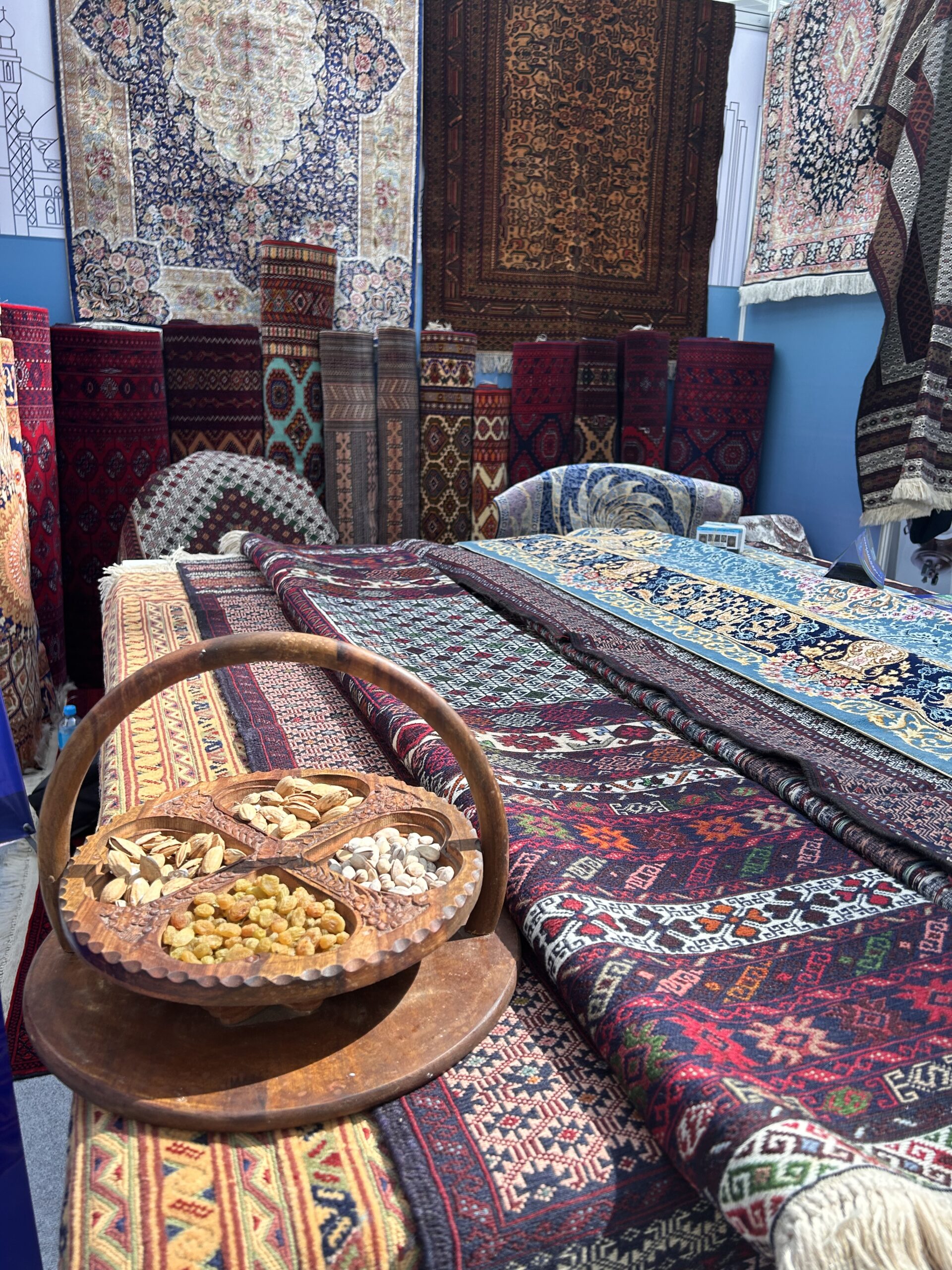
Afghan manufacturers present handmade carpets at the exhibition, which will last until Aug. 5. Photo credit: The Astana Times.
“Creation of an air corridor, the opening of representative offices of banks, the establishment of visa issuance points for entrepreneurs, holding business meetings, exhibitions, and conferences, reducing the time for transporting goods to Kazakhstan and eliminating other existing barriers to trade and transit from Kazakhstan brings this goal closer to reality,” he said.
Azizi proposed to the Kazakh side to apply a preferential tariff on imported Afghan goods to support the Afghan industry and asked for special discounts on the price of wheat and flour imported to Afghanistan from Kazakhstan to support the Afghan population and the private sector.
“There are real and practical investment opportunities in mining, industry, agriculture, trade, and services in Afghanistan, and we hope to see more investment activity from Kazakh businesspersons in Afghanistan,” he noted.
Raimbek Batalov, the chairman of the Presidium of Atameken National Chamber of Entrepreneurs, said that Kazakhstan is ready to open a trading house with Afghan manufacturers with an exhibition hall and encouraged businesspeople to join this project. He also highlighted the significance of the banking sector in accelerating bilateral cooperation.
According to General Director of QazTrade Center for Trade Policy Development, Rustam Asulbek, Almaty is being considered as a location for the trading house.
Batalov also mentioned the initiative of the Kazakh government to open a trading house of Kazakhstan in Afghanistan in the province of Herat, which serves as a distribution hub, connecting Iran, Pakistan, and Turkmenistan.
“We are also ready to consider the possibility of opening a joint chamber of commerce and industry,” he noted.
Kazakh Deputy Minister of Foreign Affairs, Kanat Tumysh, said Kazakhstan continues its humanitarian support to the Afghan people. Over the past two years, Kazakhstan sent 10,000 tons of goods, products, and other essential items, including medication, as part of humanitarian aid. The last batch consisted of 81 rail cars with food products delivered to Kabul.
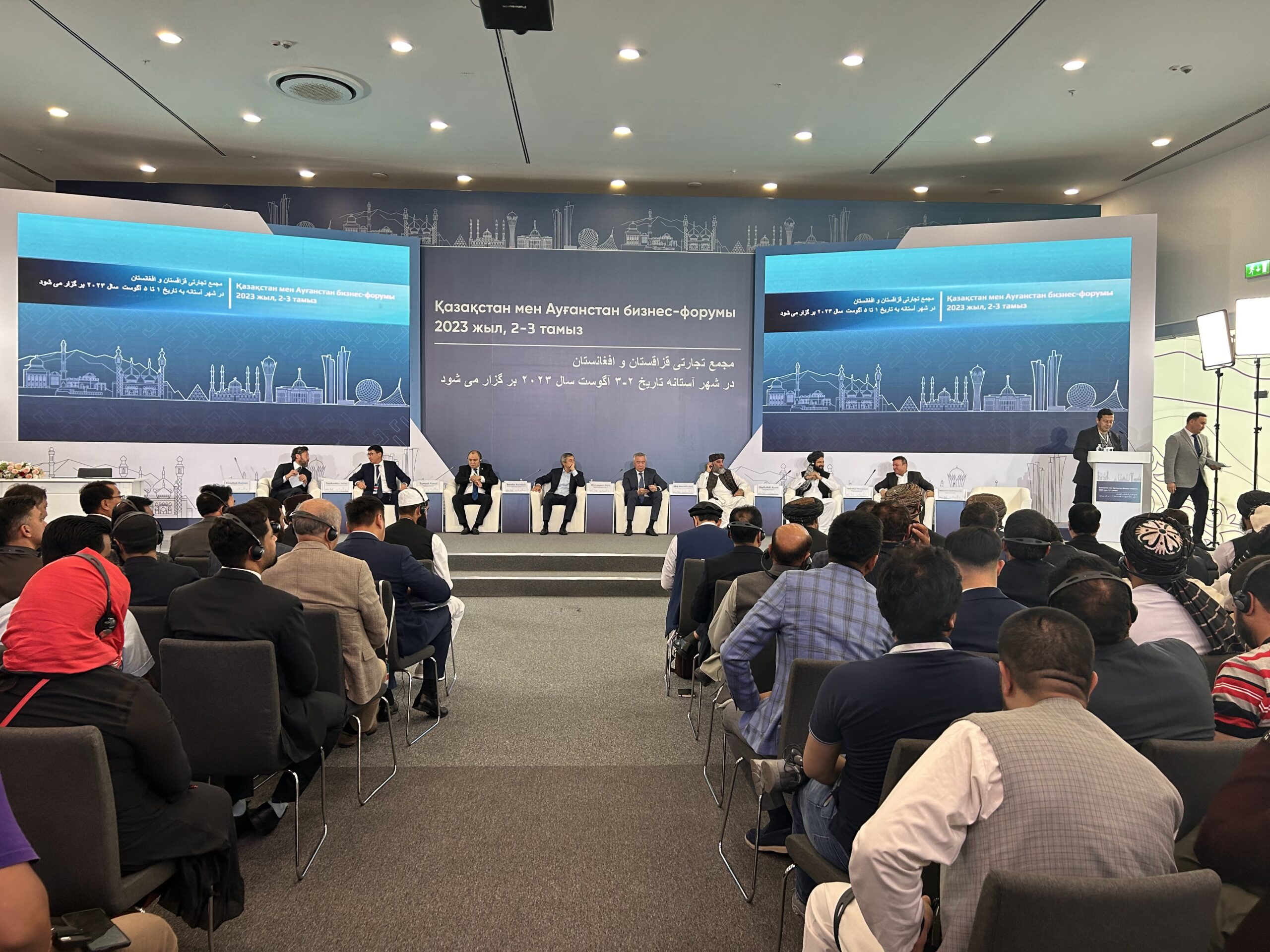
The event gathered some 300 participants from both sides. Photo credit: The Astana Times.
Kazakhstan also implements education programs at domestic universities for the nationals of Afghanistan. This year, the country allocated 30 places for Afghan students. More than 450 Afghan students study in Kazakhstan today.
Afghan businessperson Ismail Ghazanfar, chairman and CEO of Ghazanfar group, asked the Kazakh side to consider facilitating the visa regime for Afghan citizens.
Nurlan Kulbatyrov, the deputy General Director of QazTrade, named three pillars of Kazakh-Afghan relations: mutually beneficial trade, humanitarian cooperation, and the search for opportunities for transport connectivity between the regions.
The forum also marked the opening of an exhibition of traditional Afghan products, including handmade carpets, drinks, jewelry, saffron, and construction products.
The free exhibition will run from 10 a.m. – 5 p.m. on Aug. 4-5 at the Astana Congress Center.

